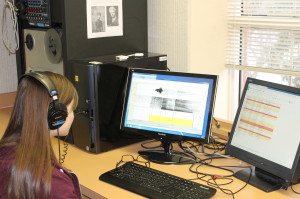How do humans recognize speech? How do factors such as native language, age, and dialect have an effect on the way in which words are recognized? A common concern among people as they get older is age related decline; in other words, does our cognitive ability decline with age? Ramscar et al. (2014) show that it may not be the case that older readers are slower due to cognitive decline. Will similar result be found for listeners when they hear language? Additionally, interactions with speakers of other dialects can be a relatively common occurrence. How is it that there are some dialects that are easy to understand and that other dialects are more difficult to understand? Are there aspects of these dialects that are more difficult to adapt to than others (Clarke & Garrett, 2004)? The present proposal seeks to
investigate these and other questions regarding spoken language recognition. There are many ways in which answers to these questions can be found, one way is by creating and conducting large studies.
This megastu dy contains over 26,000 words and 9,600 non-words from a male speaker of Western Canadian English. Participants (largely from Edmonton, AB) will span ages ranging from 20-70 years. Participants will also be expanded to include additional dialect regions (Arizona, USA; Nova Scotia; New Zealand).
dy contains over 26,000 words and 9,600 non-words from a male speaker of Western Canadian English. Participants (largely from Edmonton, AB) will span ages ranging from 20-70 years. Participants will also be expanded to include additional dialect regions (Arizona, USA; Nova Scotia; New Zealand).
This project will contribute to the ongoing investigation of language comprehension. Novel and
theoretical contributions emerging from this research program:
– testing and creation of models of spoken word recognition
– creation of an open source dataset which can be used by a wide range of researchers
– insight into how age related anatomical changes in the voice affect spoken word recognition
– insight into how aging affects spoken word recognition
– insight into how dialect affects spoken word recognition
